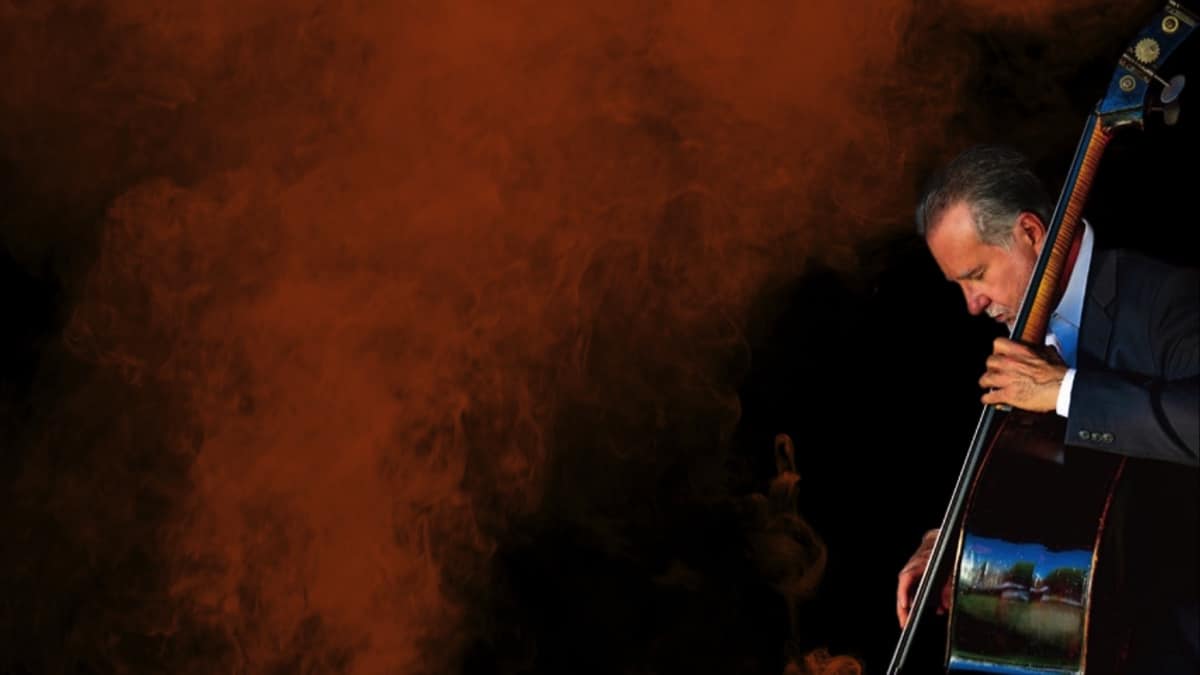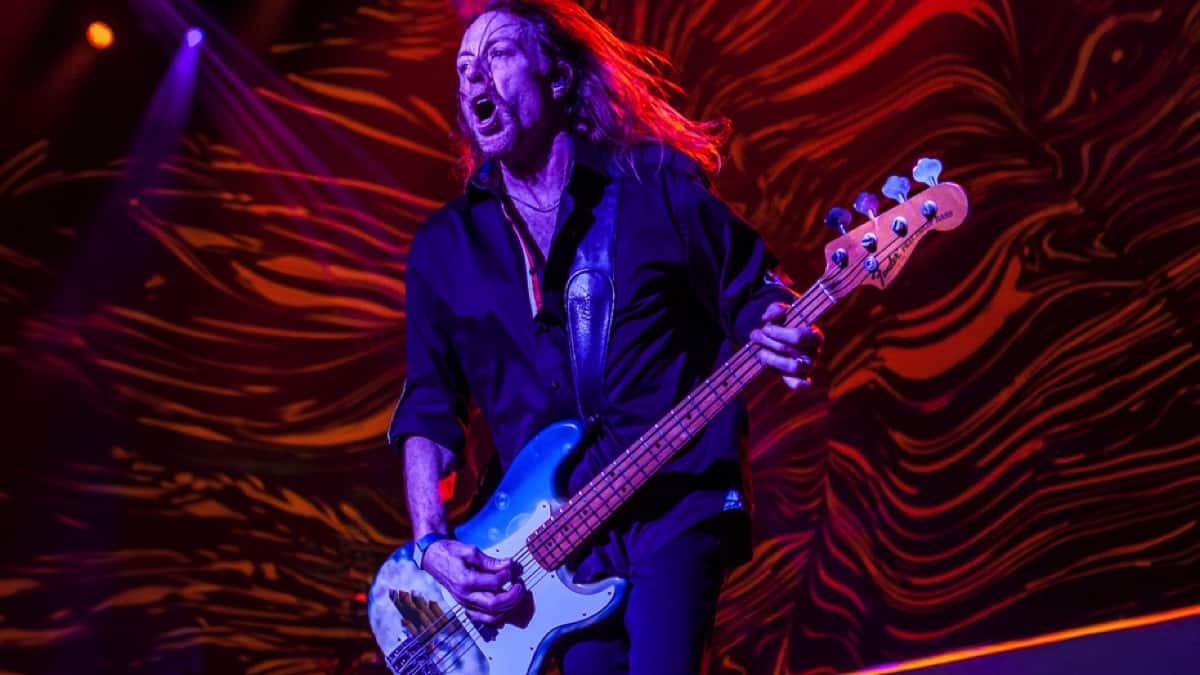Cover
Bass Musician Magazine: Aug/Sep 2009 Anniversary Issue Featuring Michael Manring

Jake: I can’t comprehend, and it’s an extreme compliment, how you could be in standard tuning doing a tune and then switch over to an altered tuning and continue on in that tune with the ease that you do—I can’t grasp that one.
Michael: It’s a bit of a trick. Part of it is that you can use that to work in your favor. It’s sort of like a karate idea where you use someone’s weight against them and try to turn it into an advantage as opposed to a disadvantage. The fact that you’re lost can be helpful to you, as it allows you to generate new ideas. Of course you have to watch the timing of being lost; you don’t want to do that on the big gig. But there are times when you can jump into a different tuning and it makes you think so differently that it might help spur your creativity a little. You know, the four string bass is a pretty simple instrument, especially with the fact that the strings are tuned to the same interval. It’s a pretty simple instrument to grock compared to a lot of other instruments where every key has a different kind of shape or pattern you have to adjust to. It’s really a matter of making the transpositions between the strings. The patterns can’t remain the same, and you need to kind of orient yourself around those patterns. If you’re used to working with a lot of different types of scales, it’s the same process…. it’s just like a learning to play a new scale.
Jake: I know you’re on the road quite a lot. Do you feel there is a bigger audience these days for I guess I’ll say, more creative music, music outside what’s driven by the industry?
Michael: I guess it kind of depends on what your frame of reference is, what you’re comparing it to. I think the audience “is” out there. It’s not a huge, but it never has been. It is tough, and always has been tough, but things are always changing. What wasn’t tough a few years ago may be tougher now, but then again things kind of open up in different ways. I do have the feeling that people are at a place now where there is this small interest in as you say creative music. I think maybe that has been generated by the fact that folks have been exposed to a lot of commercial music, and the average person can buy a computer program now which allows them to make some sort of commercial music on. But to see somebody that’s dedicated a lifetime to an instrument, and be able to watch them play live is coming back a bit. I think there’s a small group of people that are starting to rediscover the value in that. And I think there is some awareness now that a lot of the big pop shows that people are going to see are an awful lot of smoke and mirrors. A lot of these shows have it setup where the musician’s seem to be playing live, but all your hearing are samples from the records. So I think that there “are” a certain amount of people out there who are appreciating seeing someone who is actually playing live and witness that first hand.
Jake: You’ve done a fair amount of projects with one or two other bassists’ and quite a few with acoustic guitarists as well. Do you ever have the desire to put a larger ensemble together, and if you did, who are some of the players you’d enjoy working with?
Michael: These days I just don’t have much interest. I’m mostly interested in composing for solo bass. I know some people will be disappointed by that, but I’m just very fascinated with what’s possible as far as solo bass is concerned. It just feels like an important thing to do. I’ve written a lot of music for all kinds of ensembles over the years, including some symphonic stuff. I just got a request from a symphony to compose something for bass and orchestra, but I turned it down. That’s just not something I want to do right now. In the future, that’s definitely a possibility. There are several types of projects I might be interested in doing in the future with larger groups, but at the moment, I’m just really enjoying focusing on solo bass.
Jake: Let me throw you into teacher mode here if I may. I think all of us as we gain experience tend to shift our teaching methods a bit. If a young and talented student came on board with you at this point in time, where might you take him as an instructor?
Michael: The more teaching I do, the more I feel my role is to work with that person and understand what it is that they want to accomplish, and then try to help them accomplish that. That’s the primary thing that I try to do. There are some skills that I think any bass player can benefit from. So if I’m working with a group of students, I’m usually trying to show them those things that have been most helpful to me. But if I’m working with somebody privately, it’s mostly a matter of once again trying to figure out what they want to accomplish that gives them the most fulfillment in music, and then I try to help them get there and lead them along their path.
Bass Videos
Brian Bromberg, Paying Tribute to Scott LaFaro, April 2024

Brian Bromberg, Paying Tribute to Scott LaFaro, April 2024…

Brian Bromberg is one heavy-hitting bass player and I am in awe of his talent as one of the few individuals who is equally proficient on electric and upright bass.
You might remember our conversation back in 2018 when he released his powerhouse Funk album. Brian’s “A Little Driving Music” album is a staple on all our road trips and his Jaco and Jimi Hendrix tribute albums are mind-blowing… and I could go on and on.
Now, Brian has taken on the arduous task of producing an album paying tribute to the late, great, Scott LaFaro. He teamed up with pianist Tom Zink and drummer Charles Ruggiero and Brian delivers a commanding performance on upright. The entire album is a masterpiece and a real treat to listen to track after track.
Join us as Brian shares the details behind this project and more.
Photo, Michel Bocandé
Featured Videos
Visit Online
brianbromberg.net
FB @BrianBrombergBassist
YouTube
Cover
Leland Sklar, Over Half a Century of Bass, March 2024

We all have enjoyed Leland Sklar’s Bass lines for over half a century.

You might remember that we had him on our cover back in 2017 and did an update when he launched his book “Everybody Loves Me” in 2020. It was exciting to hear that The Immediate Family had got back together in the studio to work on their own music in 2019 and are now up to two albums.
Just last December, Magnolia Pictures released a documentary titled “Immediate Family” where we got a behind-the-scenes look at the massive contributions Danny Kortchmar, Waddy Wachtel, Ross Kunckle, Leland Sklar and Steve Postell have made in countless songs that are the very essence of our daily personal musical soundtracks. Seeing the astronomical roster of performers they have supported over many years is very eye-opening. It is a must-see for any music lover!
Now, I am thrilled to bring you a special chat with Leland Sklar where we go more in-depth into the bass side of his musical journey.
Photos: Header, Rob Shanahan – Cover Photo, Jay Gilbert/Chris Schmitt
Featured Videos:
Skin In the Game – https://www.youtube.com/watch?v=QhbnzIrdjJ8
from new album Skin In The Game
The Toughest Girl In Town – https://www.youtube.com/watch?v=UVQLZIRfLjU
from new album Skin In The Game
Fair Warning – https://www.youtube.com/watch?v=1DN18DYwLsU –
from the self-titled album The Immediate Family
Visit Online
www.immediatefamilyband.com/
www.facebook.com/TheImmedFamily
www.instagram.com/theimmedfamily/
Bass Videos
Ricky Phillips, STYX Bass And More – February 2024

Ricky Phillips, STYX Bass And More…

I have always been a huge Styx fan. Their music kept me awake during countless nights studying and gave my imagination a place to escape when I had a moment to take a break.
I had the immense opportunity to chat with STYX bassist Ricky Phillips for our August Cover in 2017 and follow his projects as time passed. Now, I am thrilled to have the opportunity to catch up with Ricky as he has been super-busy over the past six years.
Join me as we take a deep dive into the band’s most recent album “Crash the Crown” and EP “The Same Stardust”. Ricky shares some insights into the herculean team effort behind the scenes and the musical process that keeps them ever so busy and how he has updated his sound.
Without further ado… Here is Ricky Phillips!
Photo: Jason Powell
Featured Videos:
“Crash of the Crown” lyric video
“Reveries” lyric video
“Save Us From Ourselves” lyric video
“Sound the Alarm” lyric video
“Too Much Time On My Hands” Zoom video 2020
Visit online:
www.Styxworld.com
FB & IG @styxtheband
Bass Videos
Jeff Pilson, Foreigner Low End – January 2024

Jeff Pilson, Foreigner Low End – January 2024…

Those of us who were around back in the 70’s remember how certain songs on the radio resonated with us. It turns out that many of these iconic melodies came from Foreigner and they were part of our personal soundtracks!
After all these years, the band is going as strong as ever with Jeff Pilson firing away on bass midstream into a 2-year farewell tour.
I am excited to be able to bring you all the details about Jeff’s musical Journey, the farewell tour in progress, how he gets his sound and his plans for the future.
Cover Photo: Krishta Abruzziini / Video Photos: Krishta Abruzzini, Karsten Staiger, Gina Hyams
Featured Videos
For more news on FOREIGNER and upcoming Farewell Tour dates, fans can visit:
foreigneronline.com
facebook.com/Foreigner
twitter.com/ForeignerMusic
instagram.com/foreignerlive
youtube.com/user/FWebTeam
Also on FB @officialjeffpilson
Bass Videos
Rodney O’Quinn, Rockin’ Hard Through the Years – December 2023

Interview With Foghat Bassist Rodney O’Quinn…

Many rock fans have enjoyed music by Foghat, who originally formed in London back in 1971.
Over the many decades of playing, the band members have changed, leaving behind only Roger Earl as the only original member. Bassist Rodney O’Quinn left the Pat Travers Band and joined the group in 2015 and has been laying down the low end for this iconic quartet keeping the Foghat legacy alive. With a new album titled “Sonic Mojo” which dropped on November 10th, the band is as busy as ever and there is lots of very tasty music to come.
Join me as we learn of Rodney O’Quinn’s musical journey, how he gets his sound, and his plans for the future.
Photos:
Cover, Jake Coughlin
Video Thumbnail, Tom Apathy
Photos used in the video: Kerry Quinn, Chuck Lanza, Kim Granger, Kenneth Strohm, Jake Coughlin, Jay Jylika
Featured Videos:
1st Single from Sonic Mojo – Official “Drivin’ On”
2nd Single from Sonic Mojo – “She’s a Little Bit of Everything Official Video
“Road Fever”- California Mid State Fair – Paso Robles, CA – 7-27-22
“Stone Blue” – Rodney O’Quinn Bass/Lead Vocals – Don Odell’s Legends – Woonsocket, R.I – 10/15/22 – The Stadium Theater
The Earl’s Court – Season 2, Episode 7: Funny Guys
“I Just Want to Make Love to You” – CasinoRama – 6-9-23
FOGHAT “Somebody’s Been Sleepin’ in My Bed” – Mohegan Sun, Uncasville, CT – 1/28/22
“I Just Want to Make Love to You” – California Mid State Fair – Paso Robles, CA – 7-27-22
Visit Online:
www.foghat.com
www.facebook.com/Foghat
www.twitter.com/FOGHAT
www.instagram.com/foghat_official
www.youtube.com/user/FOGHATMUSIC


















